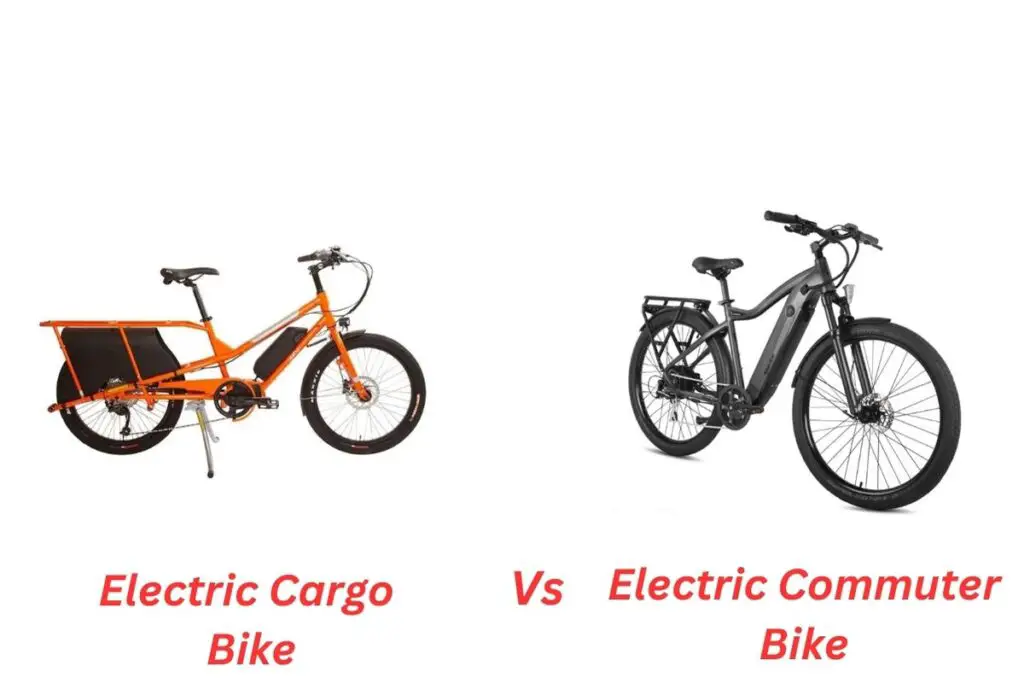
Electric bikes have revolutionized the way we commute and transport goods, offering efficient and eco-friendly alternatives to traditional bicycles and motor vehicles. Among the various types of electric bikes available, two popular options are electric cargo bikes and electric commuter bikes. Here, we’ll explore the key features, benefits, and considerations of both electric cargo bikes and electric commuter bikes to help you determine which one is right for you.
Electric Cargo Bikes
Electric cargo bikes are specifically designed to handle heavy loads and provide a practical solution for transporting goods. These bikes feature a sturdy frame, often with a longer wheelbase, and are equipped with an electric motor to assist with pedaling. The motor provides extra power, making it easier to transport heavy loads over longer distances or challenging terrains.
Benefits and Use Cases
The benefits of electric cargo bikes are numerous and make them a practical choice for individuals and businesses alike.
First and foremost, electric cargo bikes provide a sustainable and eco-friendly mode of transportation.
By replacing traditional delivery vans or cars with electric cargo bikes, you can significantly reduce carbon emissions and contribute to a cleaner environment.
Additionally, using electric cargo bikes for local deliveries or errands can be cost-effective, eliminating the need for fuel and parking fees.
Considerations for Choosing an Electric Cargo Bike
When considering whether an electric cargo bike is right for you, several factors come into play. First and foremost, evaluate your cargo capacity requirements.
Consider the size and weight of the items you intend to transport regularly and ensure that the electric cargo bike you choose can accommodate them comfortably.
Assess the cargo area and any additional accessories or attachments available to secure and organize your cargo effectively.
Battery range is a critical consideration, especially if you plan to cover longer distances or have multiple stops during your rides.
Evaluate the capacity and estimated range of the electric cargo bike’s battery to ensure it aligns with your transportation needs. It’s also worth considering the charging time required to replenish the battery fully.
Related: Electric Folding Bike vs. Electric Fat Bike: Which is More Practical?
Electric Commuter Bikes
Electric commuter bikes are designed primarily for daily commuting and urban transportation. They share similarities with traditional bicycles in terms of their frame design, but they are equipped with an electric motor to assist with pedaling.
These bikes prioritize lightweight construction, agility, and efficiency to provide a convenient and comfortable mode of transportation for urban environments.
One of the key features of electric commuter bikes is their focus on ride comfort. They often incorporate suspension systems or ergonomic designs to absorb road vibrations and provide a smoother ride.
The frames are typically made of lightweight materials such as aluminum or carbon fiber, enabling easier maneuverability and reducing overall weight. Electric commuter bikes also feature smaller and more compact batteries compared to cargo bikes, as their purpose is to support shorter commuting distances.
Benefits and Use Cases
Electric commuter bikes offer several advantages for daily commuting. They provide a convenient and efficient mode of transportation, allowing you to navigate through urban areas with ease.
With the electric motor assistance, you can cover longer distances or conquer challenging terrains without exerting excessive effort.
Electric commuter bikes are particularly appealing for individuals who prefer a less strenuous commute or want to avoid arriving at their destination sweaty or fatigued.
Another significant benefit of electric commuter bikes is their contribution to a greener and healthier environment.
By choosing an electric bike for your daily commute, you reduce air pollution and carbon emissions, helping to create more sustainable cities.
Electric commuter bikes can also promote a healthier lifestyle by encouraging physical activity and reducing reliance on sedentary modes of transportation.
Considerations for Choosing an Electric Commuter Bike
When considering an electric commuter bike, there are several factors to keep in mind. First and foremost, evaluate your commuting distance.
Ensure that the electric commuter bike you choose can comfortably cover the distance you need to travel without requiring frequent recharging.
Consider the battery capacity and estimated range to ensure it aligns with your commuting needs.
Ride comfort is another important aspect to consider, especially if you’ll be spending a significant amount of time on the bike during your daily commute.
Look for features such as front suspension forks or seat suspension that can absorb road vibrations and provide a smoother ride.
Ergonomic designs, adjustable handlebars, and comfortable seating can also enhance the overall riding experience.
Read Also: RadRover 6 Plus vs. RadRunner Plus: Compared
Comparing Electric Cargo Bikes and Electric Commuter Bikes
Key Differences
Electric cargo bikes and electric commuter bikes have distinct design elements and functionality that set them apart.
Electric Cargo Bike
Electric cargo bikes are specifically designed for carrying heavy loads and transporting goods.
They feature a sturdy frame, a longer wheelbase, and a spacious cargo area in the front or rear.
These bikes prioritize cargo capacity and weight-carrying capabilities.
The electric motor provides assistance to tackle challenging terrains and longer distances while carrying heavy loads.
Electric Commuter Bike
Electric commuter bikes prioritize lightweight construction, agility, and ride comfort.
They resemble traditional bicycles with a more streamlined frame and a focus on maneuverability in urban environments.
The electric motor assists with pedaling to cover longer distances or conquer hilly terrains, making daily commuting more convenient and less physically demanding.
Suitability for Different Individuals
The suitability of electric cargo bikes and electric commuter bikes depends on individual preferences, lifestyle, and transportation needs.
Electric Cargo Bike
Electric cargo bikes are well-suited for individuals or businesses that require efficient transportation of goods.
They are ideal for those who frequently carry heavy loads, such as groceries, supplies, or equipment. Families can also benefit from electric cargo bikes for transporting children.
The spacious cargo area and weight-carrying capacity make them a practical choice for various purposes.
Electric Commuter Bike
Electric commuter bikes, on the other hand, are best suited for individuals who primarily use their bikes for daily commuting or urban transportation.
They offer a convenient and eco-friendly mode of transportation for shorter distances. Electric commuter bikes are appealing to those who prioritize ride comfort, efficiency, and the ability to navigate through traffic or congested urban areas easily.
Pros and Cons
Both electric cargo bikes and electric commuter bikes have their pros and cons, which should be considered when making a decision.
Electric Cargo Bike
Electric cargo bikes provide numerous benefits, such as the ability to transport heavy loads and goods efficiently.
They offer an eco-friendly alternative to traditional delivery vehicles and provide cost savings in terms of fuel and parking fees.
However, electric cargo bikes can be larger and heavier, making maneuverability and storage more challenging. They are also better suited for specific use cases that involve frequent cargo transportation.
Electric Commuter Bike
Electric commuter bikes excel in providing a convenient and comfortable commuting experience.
They allow riders to cover longer distances and conquer challenging terrains with ease. Electric commuter bikes contribute to a greener environment and promote a healthier lifestyle.
However, they may have limited cargo capacity compared to electric cargo bikes, making them less suitable for transporting bulky items or carrying substantial loads.
Read Also: Heybike Mars vs. Ranger: Comparing Two Exceptional E-Bike Models
How to Choose the Right Bike for You
Assessing Your Needs and Priorities
When deciding between an electric cargo bike and an electric commuter bike, it’s essential to assess your needs, priorities, and specific requirements.
Primary Use
Consider your primary use case. Are you primarily looking for a bike that can transport heavy loads and goods, or do you need a bike for daily commuting and urban transportation? Understanding your main purpose will help narrow down your options.
Cargo Requirements
Evaluate your cargo requirements. If you frequently need to transport bulky items or carry substantial loads, an electric cargo bike might be the better choice.
On the other hand, if you primarily need a bike for commuting and occasional errands, an electric commuter bike may suffice.
Commuting Distance
Take into account your typical commuting distance. If your daily commute involves longer distances, consider an electric commuter bike with a battery that can provide sufficient range.
For shorter commutes, the range of an electric cargo bike may be less of a concern.
Test Rides and Considerations
Before making a final decision, it’s highly recommended to test ride both electric cargo bikes and electric commuter bikes, if possible.
This hands-on experience will allow you to feel the differences in handling, maneuverability, and overall comfort.
Bike Weight
Pay attention to factors such as bike weight, ease of control, and the riding position.
Electric cargo bikes tend to be heavier and may require more effort to maneuver, especially in tight spaces.
Electric commuter bikes, on the other hand, prioritize agility and maneuverability, allowing for smoother navigation through urban environments.
Additional Features and Accessories
Consider additional features and accessories that may enhance your riding experience.
Look for features like suspension systems, adjustable seats or handlebars, integrated lights, and fenders.
These features can contribute to a more comfortable and enjoyable ride, regardless of the bike type you choose.
Budget Considerations
Finally, it’s essential to consider your budget when choosing an electric cargo bike or electric commuter bike.
Electric cargo bikes often come with a higher price tag due to their larger size, cargo capacity, and specialized design.
Electric commuter bikes, being more similar to traditional bicycles, can offer more budget-friendly options.
Read Also: Liv Alight 3 Review
Conclusion
When it comes to choosing between an electric cargo bike and an electric commuter bike, understanding your specific needs and priorities is crucial. Electric cargo bikes excel in carrying heavy loads and providing a sustainable solution for businesses and individuals requiring efficient transportation of goods. On the other hand, electric commuter bikes prioritize ride comfort, agility, and convenience for daily commuting and urban transportation.
